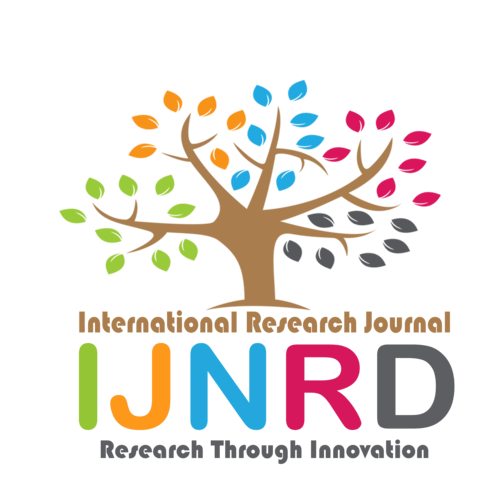|
|||||||||||||||

|
INTERNATIONAL JOURNAL OF NOVEL RESEARCH AND DEVELOPMENT International Peer Reviewed & Refereed Journals, Open Access Journal ISSN Approved Journal No: 2456-4184 | Impact factor: 8.76 | ESTD Year: 2016 Scholarly open access journals, Peer-reviewed, and Refereed Journals, Impact factor 8.76 (Calculate by google scholar and Semantic Scholar | AI-Powered Research Tool) , Multidisciplinary, Monthly, Indexing in all major database & Metadata, Citation Generator, Digital Object Identifier(DOI) |
||||||||||||||
Issue: April 2024
Volume 9 | Issue 4
Review Result and Publication of Paper within : 2-3 days
Click Here For more DetailsFor Authors
Forms / Download
Published Issue Details
Editorial Board
Other IMP Links
Facts & Figure
Impact Factor : 8.76
Issue per Year : 12
Volume Published : 9
Issue Published : 95
Article Submitted :
Article Published :
Total Authors :
Total Reviewer :
Total Countries :
Indexing Partner
Join RMS/Earn 300
Licence
This work is licensed under a Creative Commons Attribution-NonCommercial 4.0 International License







|
Published Paper Details
|
|
| Paper Title: | ROLE OF ICT TRANSFORMATION IN BRITISH COLONIAL CRIMINAL TRIBES - A CASE STUDY FROM THE YERUKALA COMMUNITY AT STUARTPURAM ANDHRA PRADESH STATE |
| Authors Name: | DR. DASARI RAJESH BABU |
| Download E-Certificate: | Download |
| Author Reg. ID: |
IJNRD_198648
|
| Published Paper Id: | IJNRD2306109 |
| Published In: | Volume 8 Issue 6, June-2023 |
| DOI: | |
| Abstract: | For longer periods in history, tribes had little or no intercourse with people in the plains areas and were uninfluenced by the so-called civilizing influences. The relative isolation led to their backwardness as the agents of development deployed by the mainstream state could not penetrate into the deeper forest regions. The situation underwent a change with the advent of the British who saw great opportunity of exploiting the forest wealth by intruding into the private spaces hitherto inhabited by Adivasis. To avoid the problem posed by tribes, the British government passed the first Criminal Tribes Act in 1871 under the pretext of controlling the rate of crime. Under the Act, several tribes were declared criminal and settlements were started where tribesmen and women were lodged. The task of their management was entrusted to voluntary agencies such as Salvation Army, Chief Anjuman Islamia, Arya Samaj etc. In addition, the government too at some places was directly involved in organizing reformatory settlements. Settlements were classified under agricultural, industrial, reformatory and penal settlements. Yerukala and Katheras are two ex-criminal tribes of Andhra Pradesh. These two groups are stigmatized as dacoits, burglars, pilferers, thieves and railway wagon breakers. Stuartpuram is one of the settlements established in 1914 by the colonial government. It was an agricultural settlement put under the management of Salvation Army. The organization executed monumental development programme for the benefit and welfare of the settlers. They included agriculture, education, health and vocational training activities. Salvation Army enjoyed judicial powers while managing the settlement. Basic approach to change and reform of the settlers adopted by the organization was religious in nature which as such had some inbuilt limitations. The Salvation Army was active for almost four decades before the tribal welfare department took over the settlement after independence. The organization continues its religious-social work till date. The second major attempt at reforming and mainstreaming inhabitants of Stuartpuram settlement was initiated in the year 1974 by a group of seculars and a religious humanist from the Atheist Centre, Vijayawada. Criminal reformation is three-dimensional process involving different kinds of actors and characters: criminals themselves, the state machinery including police/government officials and finally society at large. Of these variables, surrounding society plays a major role, either to accept or deny reformed criminals into mainstream ways of life. When this variable is in place, rest of the variables follow the suit. Samskar (NGO) represented this important social variable in the process of social reform and rehabilitation of members of Stuartpuram colony. The organization executed its work in five phases through a strategy known as Three Generation Approach. Major emphasis of social reformers during the process had been on social integration and area development through 3G Approach. Social reform experiments in a DNT colony hint at one important historical lesson that traditional approaches to the problem of despised social heritage have reduced scope for reform of diehard avocations of hardened criminals. On the other, humanist and democratic interventions provide enough social space for bringing about the desired change. |
| Keywords: | Cast, Tribe, criminals, Acts, community, NGOs, Notified tribal, Denotified tribal, Schemes, sub plan. |
| Cite Article: | "ROLE OF ICT TRANSFORMATION IN BRITISH COLONIAL CRIMINAL TRIBES - A CASE STUDY FROM THE YERUKALA COMMUNITY AT STUARTPURAM ANDHRA PRADESH STATE", International Journal of Novel Research and Development (www.ijnrd.org), ISSN:2456-4184, Vol.8, Issue 6, page no.b74-b90, June-2023, Available :http://www.ijnrd.org/papers/IJNRD2306109.pdf |
| Downloads: | 000118756 |
| ISSN: |
2456-4184 | IMPACT FACTOR: 8.76 Calculated By Google Scholar| ESTD YEAR: 2016 An International Scholarly Open Access Journal, Peer-Reviewed, Refereed Journal Impact Factor 8.76 Calculate by Google Scholar and Semantic Scholar | AI-Powered Research Tool, Multidisciplinary, Monthly, Multilanguage Journal Indexing in All Major Database & Metadata, Citation Generator |
| Publication Details: |
Published Paper ID:IJNRD2306109 Registration ID: 198648 Published In: Volume 8 Issue 6, June-2023 DOI (Digital Object Identifier): Page No: b74-b90 Country: MUSHEERABAD, HYDERABAD, TELANGANA, INDIA Research Area: Social Science and Humanities Publisher : IJ Publication Published Paper URL : https://www.ijnrd.org/viewpaperforall?paper=IJNRD2306109 Published Paper PDF: https://www.ijnrd.org/papers/IJNRD2306109 |
| Share Article: | |
|
Click Here to Download This Article |
|
| Article Preview | |
|
|
|
Major Indexing from www.ijnrd.org
| Semantic Scholar | Microsaoft Academic | ORCID | Zenodo |
| Google Scholar | ResearcherID Thomson Reuters | Mendeley : reference manager | Academia.edu |
| arXiv.org : cornell university library | Research Gate | CiteSeerX | PUBLON |
| DRJI | SSRN | Scribd | DocStoc |
ISSN Details
 |
 |
ISSN: 2456-4184
Impact Factor: 8.76 and ISSN APPROVED
Journal Starting Year (ESTD) : 2016
DOI (A digital object identifier)
Conference
Open Access License Policy
Important Details
Social Media
| Copyright © 2024 - All Rights Reserved - IJNRD |












Facebook Twitter Instagram LinkedIn